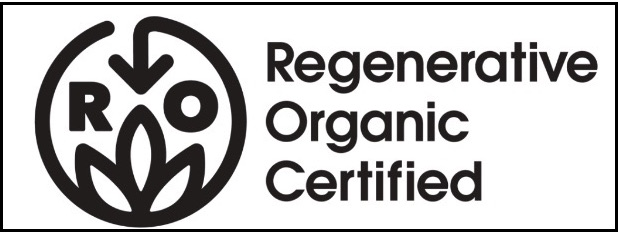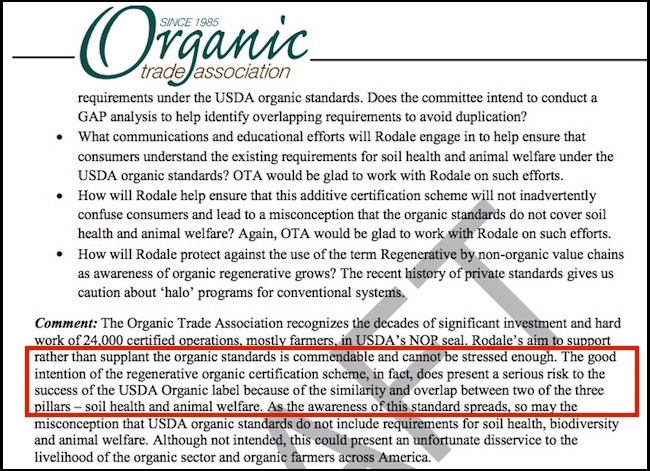
The Organic Trade Association Warns its Members that the Regenerative Organic Certification Presents a "Serious Risk" to the USDA Organic Label
With the Regenerative Organic Certification (ROC) set to formally enter the marketplace in 2018, the Rodale Institute has been soliciting input from all stakeholders in regards to the proposed standards.
From the beginning, the Rodale Institute has stated that the ROC “does not aim to supplant current organic standards” but it “aims to support these standards while at the same time facilitating widespread adoption of holistic, regenerative practices throughout agriculture.”
Last Friday, the Organic Trade Association (OTA) submitted its formal comments about the ROC and had numerous questions and concerns, one of which was:
As the awareness of the regenerative organic standard (ROC) spreads, so may the misconception that USDA organic standards do not include requirements for soil health, biodiversity and animal welfare.
“If the concern is that the ROC will be confusing to consumers, the OTA has a point,” said Stephanie Strom, the former food business journalist at The New York Times and a long-time industry observer.
There is no doubt that communicating the difference between USDA certified organic and ROC will be an issue. Reports show that shoppers still do not truly understand what organic means because they seek out “natural” and “Non-GMO” claims more often than “certified organic” claims, even though “certified organic” is a far superior label.
In its comments about the ROC, the OTA went on to say:
Although not intended, this (the misconception that USDA organic standards do not include requirements for soil health, biodiversity and animal welfare) could present an unfortunate disservice to the livelihood of the organic sector and organic farmers across America. It’s critical that a new Regenerative Organic Certification does not come at the expense of the hardworking farmers and handlers who choose USDA organic certification.
I asked Gwendolyn Wyard, Vice President of Regulatory and Technical Affairs for the Organic Trade Association, for clarification about what exactly this “expense” might be.
She responded, “We want farmers, handlers AND consumers to continue to see the USDA organic seal as legitimate, AND recognize that ROC builds upon a very strong foundation. USDA organic is the baseline to the ROC standard, and we want to ensure that the ROC becomes a supporting label rather than a competing label that could confuse the market.”
However, in draft comments about the ROC that the OTA circulated to its members on November 28th and what was reported in Sustainable Food News on December 1st, the OTA issued a much, much stronger warning about the potential ramifications of the ROC.
The good intention of the regenerative organic certification scheme, in fact, does present a serious risk to the success of the USDA Organic label because of the similarity and overlap between two of the three pillars – soil health and animal welfare.

These comments about the ROC being “a serious risk” to the success of the USDA organic label were not included in the OTA’s official comments submitted to NSF, the agency overseeing the ROC.
In a follow-up email, OTA’s Gwendolyn Wyard stressed “that any characterization of our position or comments as a ‘conflict brewing between OTA and the ROC’ would be inaccurate and misleading. Our comments are supportive and constructive.”
Jeff Moyer, Executive Director of the Rodale Institute, told me, “We continue to support the work of the OTA, the National Organic Program (NOP) and the National Organic Standards Board (NOSB) to grow and foster the organic community. ROC does not aim to compete with or negate the organic standard. ROC will give farmers further along in the process, or with additional existing certifications, marketing opportunities that represent the work they are doing to improve the resources that they use in their operations. Organic is a Rodale Institute word and always will be.”
Ultimately, the nature of the relationship between the OTA and ROC will depend on how successful the ROC is and whether or not the market perceives the ROC to be the new gold standard in organic, displacing the USDA organic seal. If this happens, one could easily expect the OTA to take a much more aggressive stance towards the ROC.
But given that ROC’s two main backers are Dr. Bronner’s and Patagonia, the ROC will not be reluctant to defend itself.
Dr. Bronner’s quit the OTA in 2016, citing “the association’s betrayal of the consumer-led GMO labeling movement, and general drift away from the core principles that drive the organic movement.”
Rose Marcario, the CEO of Patagonia — the company who intends to sue the federal government over the Trump administration’s plans to shrink two national monuments in Utah — has made no secret about her opinion of the OTA either. “When it comes to the Organic Trade Association, they tend to favor less transparency rather than more. Customers want radical transparency,” she told Organic Insider in October.
This is a story that we will be following closely in the year ahead.
 |

Max Goldberg, Founder |
Quick Hits
* In Florida, restaurants making false claims about serving organic food are facing a new crackdown. This is a very positive development, and more states need to be following suit and getting tougher on enforcement.
* Meanwhile, a new food hall is opening in Dallas called Urban8, which will have plenty of organic options.
* Grow Ahead, a fantastic non-profit that partners with family farmer organizations around the world who are committed to regenerative organic agriculture, will be holding a webinar on December 7th at 1pm EST called Creating Resilient Supply Networks: Partnering with Small-Scale Farmers.
* Congrats to Maine’s Wood Prairie Family Farm, who won a 2018 Green Thumb Award for The Organic Potato Plant Detective, named one of the two best new edible plant introductions in the United States.
* The Middle East Organic and Natural Products Expo takes place in Dubai from December 11th to the 13th and is expected to attract 6,500 attendees from the Middle East, Africa, Eastern Europe, and Southeast Asia.
* The Grocery Manufacturers Association, which has been no friend to the organic movement, has lost yet another member — this time Mars, Inc.
* Is Big Food’s lobbying arm on the brink of extinction?
* Lastly, as I mentioned above, Patagonia is intending to sue the Trump administration for illegally reducing the size of Bears Ears and Grand Staircase-Escalante National Monuments in Utah.
* Stand in solidarity with Patagonia and tell the Trump administration that it does not have the authority to take these lands away from us by clicking HERE.
Weekly News Summaries

Bi-Partisan Support for an Increase in Funding for Organic Research
U.S. Representatives Chellie Pingree (D-ME), Dan Newhouse (R-WA) and Jimmy Panetta (D-CA) call for greater organic research funding in order to meet the industry's skyrocketing demand.
U.S. Senators Call for On-Packaging GMO Labels
Led by Jeff Merkley (D-OR), eleven U.S. senators have called for on-packaging GMO labels and that QR codes should not be used as a replacement until there is widespread internet access across the country.
Nestle Acquires Yet Another Organic Company
By Martinne Geller
Having recently acquired Chameleon Cold-Brew, Nestle has spent $2.3 billion to purchase Atrium Innovations, which owns the organic vitamin and meal replacement brand Garden of Life.
Rural America's Rejection of Industrial Agriculture
By Jacob Bunge
Groundwater pollution, infrastructure burdens and noxious smells have caused many American farm towns to oppose Big Ag's meat processing plants.

Regenerative Organic Farming Practices Encouraged in the Cannabis Industry
By Harry Resin
As the demand for cannabis explodes and the environmental consequences become more severe, a push is being made to get farmers to start incorporating regenerative organic farming practices.

Thrive Market is Building a Zero-Waste Business
By Esha Chhabra
Gunnar Lovelace, the founder of e-commerce leader Thrive Market, discusses how his company has gone zero-waste in two of its fulfillment centers.

Hain Celestial Completes the Purchase of Clarks UK Ltd.
By Rebekah Schouten
Hain Celestial has acquired the British maple syrup and natural sweetener company Clarks UK Ltd. Terms were not disclosed.

Bill Moses Launches Disruptive Brands
By Stephen Daniells
The former CEO of KeVita has launched a new platform to invest in and accelerate the growth of better-for-you food and beverage brands.
The material in this newsletter is copyrighted and may be reprinted by permission only. All requests must be in writing. Please use our contact form to request republication rights.
Newsletter Archive
Quick Hits
* In Florida, restaurants making false claims about serving organic food are facing a new crackdown. This is a very positive development, and more states need to be following suit and getting tougher on enforcement.
* Meanwhile, a new food hall is opening in Dallas called Urban8, which will have plenty of organic options.
* Grow Ahead, a fantastic non-profit that partners with family farmer organizations around the world who are committed to regenerative organic agriculture, will be holding a webinar on December 7th at 1pm EST called Creating Resilient Supply Networks: Partnering with Small-Scale Farmers.
* Congrats to Maine’s Wood Prairie Family Farm, who won a 2018 Green Thumb Award for The Organic Potato Plant Detective, named one of the two best new edible plant introductions in the United States.
* The Middle East Organic and Natural Products Expo takes place in Dubai from December 11th to the 13th and is expected to attract 6,500 attendees from the Middle East, Africa, Eastern Europe, and Southeast Asia.
* The Grocery Manufacturers Association, which has been no friend to the organic movement, has lost yet another member — this time Mars, Inc.
* Is Big Food’s lobbying arm on the brink of extinction?
* Lastly, as I mentioned above, Patagonia is intending to sue the Trump administration for illegally reducing the size of Bears Ears and Grand Staircase-Escalante National Monuments in Utah.
* Stand in solidarity with Patagonia and tell the Trump administration that it does not have the authority to take these lands away from us by clicking HERE.
